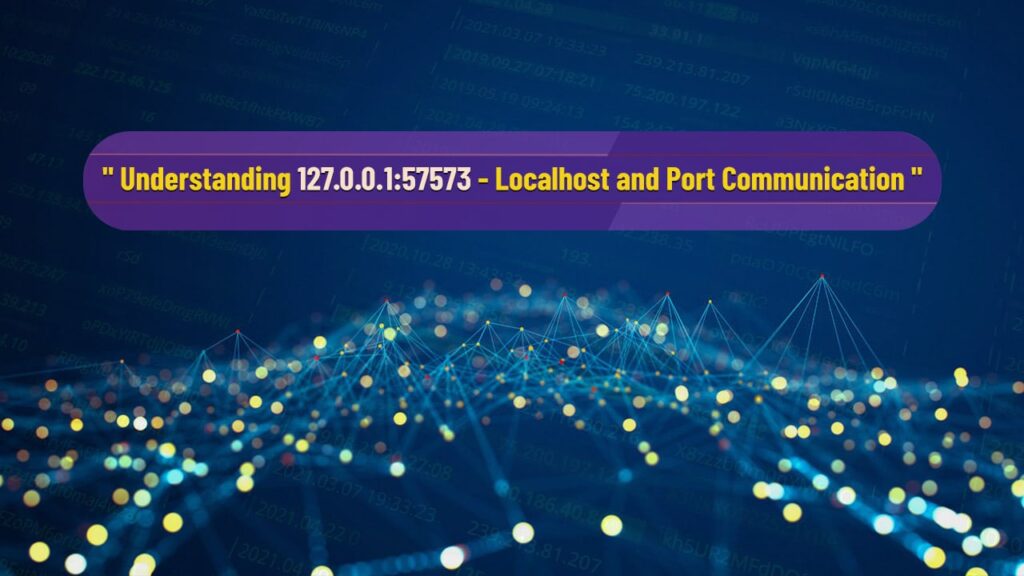In the realm of networking and computing, “127.0.0.1:57573” holds significant importance as it refers to the localhost address coupled with a specific port number. This combination serves a crucial role in facilitating communication within a single device.
Table of Contents
Understanding Localhost and Loopback Address
The IP address “127.0.0.1” is commonly known as the loopback address or localhost. It is reserved for the internal testing of networking software and services. When a device sends data to 127.0.0.1, it loops back to the same device without traversing any physical network interface.

Historical Context and Development
The concept of localhost dates back to the early days of networking and Unix-based systems. It was introduced to enable software developers to test network-related functionalities within their own machines without relying on external networks or risking security vulnerabilities.
Technical Specifications and Functionality
The address 127.0.0.1 is defined within the Internet Protocol (IP) standard IPv4 as a reserved range of addresses designated for loopback purposes. It belongs to the class A block of IP addresses, specifically reserved for loopback and diagnostic applications.
Port 57573: Defining Endpoint Communication
Ports, on the other hand, are used to specify which endpoint a particular message should be delivered to on a device. Each port number is associated with a specific process or service running on the device. Port 57573, within the context of 127.0.0.1, represents a unique endpoint through which local applications can communicate.
Practical Applications and Use Cases
Development and Testing Environments
One of the primary uses of 127.0.0.1:57573 is in software development and testing environments. Developers utilize this address and port combination to test applications locally before deploying them to production environments. By simulating network interactions on the same machine, developers can identify and resolve issues in a controlled setting.
Localhost as a Virtual Environment
The concept of localhost extends beyond mere testing. It serves as a virtual environment where various services and applications can interact without the need for external resources. This capability is particularly advantageous in scenarios where internet connectivity is limited or when sensitive data is involved.
Debugging and Troubleshooting
Network administrators and system engineers often use localhost and specific ports like 57573 for debugging and troubleshooting purposes. They can analyze network traffic, monitor service performance, and diagnose connectivity issues within the confines of their own devices.

Security Considerations and Best Practices
Firewall and Security Configuration
While localhost addresses like 127.0.0.1 are inherently secure due to their isolation from external networks, it’s essential to implement proper firewall rules and security configurations. Ports should be selectively opened and closed to prevent unauthorized access and potential security breaches.
Avoiding Common Pitfalls
Misconfigurations of ports or improperly secured services running on localhost can still pose risks. It’s crucial for administrators to regularly audit and update security measures to mitigate vulnerabilities and ensure data integrity.
Future Trends and Innovations
Evolution of Networking Technologies
As networking technologies continue to evolve, the role of localhost and loopback addresses remains integral. The advent of IPv6 introduces new possibilities for addressing and communication protocols, but the fundamental concept of localhost as a testing and diagnostic tool persists.
Integration with Virtualization and Containerization
The rise of virtualization and containerization technologies further enhances the versatility of localhost. Virtual machines and containers can simulate entire network environments within a single host, leveraging localhost addresses for internal communication.

Conclusion
“127.0.0.1:57573” exemplifies the foundational principles of local networking and loopback addresses within the domain of computer science and network engineering. Its versatility and security make it an indispensable tool for developers, administrators, and engineers alike. By enabling isolated communication and testing capabilities, localhost addresses like 127.0.0.1 continue to play a crucial role in the development, testing, and troubleshooting of software and network applications.
As technology advances, so too will the applications and implications of localhost and loopback addresses. By understanding their principles and practical applications, professionals can leverage these tools effectively to innovate and secure the future of networked systems.

FAQs
What does “127.0.0.1” mean in networking?
- “127.0.0.1” is the loopback address in IPv4 networking. It allows a device to send data to itself without involving any external network interfaces. It’s commonly referred to as “localhost.”
What is the significance of “127.0.0.1:57573”?
- “127.0.0.1:57573” combines the loopback address with a specific port number (57573). This allows local applications to communicate internally on the same device, facilitating testing and development scenarios.
How is “127.0.0.1:57573” used in software development?
- Developers use “127.0.0.1:57573” to test applications locally before deploying them to production environments. It simulates network interactions within the same machine, ensuring that software functions correctly without external dependencies.
Is “127.0.0.1:57573” secure?
- Yes, “127.0.0.1:57573” is secure because it operates within the loopback interface, isolated from external networks. However, proper security measures such as firewall configurations should be in place to prevent unauthorized access to local services.
Can “127.0.0.1:57573” be accessed from outside the device?
- No, “127.0.0.1:57573” is only accessible locally on the device where it is hosted. It cannot be accessed from external networks, ensuring data privacy and security.
What are some common troubleshooting tips for “127.0.0.1:57573”?
- Ensure that the application using port 57573 is correctly configured and running. Check firewall settings to allow local communication. Debug any connectivity issues using network diagnostic tools available on the device.
How does “127.0.0.1:57573” compare to other localhost addresses?
- “127.0.0.1” is the standard IPv4 localhost address, but different ports like 57573 can be assigned to specific applications or services running locally. Other versions like IPv6 localhost (::1) operate similarly but with IPv6 addressing.


